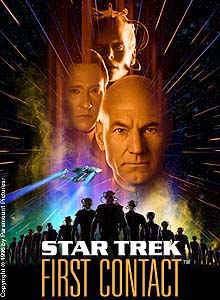Warped Values
The 'Enterprise' copes with human fallibility
By Richard von Busack
THE EIGHTH installment in cinema's brainiest franchise is, as Spock would say, satisfactory, with an especially engrossing fight scene on the outside of the Enterprise's hull. Star Trek: First Contact has something that the other special-effects-driven films have lacked this year: drama.
The aliens running loose this time are the Borg: half-machine hive-society creatures, viral zombies who change everything they encounter into replicas of themselves, and who quickly adapt to any weapon used against them. Jean-Luc Picard (Patrick Stewart), our hero and commander of the starship Enterprise, was once captured by the unclean things and subjected to their implants.
Picard flies to 2064 to head them off at the past, setting off a messy tri-form story. Firstly, the neurotic but indomitable Picard fights off an infestation of Borg on the Enterprise; secondly, the subsidiary members of the crew are on Earth in 2063, a decade or so after WWIII, trying to help out Zefram Cochrane, the hungover inventor of Warp Drive (played by James Cromwell, Farmer Hoggett of Babe), as he's about to test it. In the third part, the oddly melancholy android Data is alternatively seduced and tortured by the Borg Queen (Alice Krige).
Somewhere in this story of conflict between the Borg and humans is a study of conflict between inhuman perfection and the fallibility but warmth of flesh. Picard's dilemma at being both an icy commander and a brittle human being reflects the issue; so do Data's ambitions to be a human--as poignantly staged, I think, as the dilemma of a colonized man trying to imitate the manners of the colonials.
In one sequence, the Borg Queen grafts some artificial flesh onto the captive Data. Blowing across it, she raises goose bumps on the android's skin--an indescribably troubling image, as distressing as the wink of Brigitte Helm's False Maria in Metropolis. (The Borg Queen delivers a similar chill when she gives a little stretch of her hips, right after her head and spinal chord are inserted into her body by tentacled machines.)
Cochrane is also fighting his nature. He's too human, too fallible--a crass, drunken boor unwilling to accept the judgment of the future that he's a great man. Since we know the Warp Drive experiment turns out to be a success, there's less drama in this facet of the film. If only the filmmakers had left it an open question whether he'd survive the first test, putting some blood into his worries about whether to be a live dog or a dead lion.
That the least-interesting members of the Enterprise's crew have to tangle with the coarse Cochrane makes these scenes even more uninvolving. They include Commander Riker (Jonathan Frakes, who also directed, and always looks like someone's stand-in who was accidentally caught by the camera) and Lt. Commander La Forge (LeVar Burton), equipped with some scary glass eyes in place of his usual gold visor.
As counselor Troi, the once nubile Marina Sirtis must endure a very shoddily written drunk scene, which is too bad, because the comic possibilities of a drunken empath are tempting. Who knows what she'd blurt out? (Sirtis radiates smugness; she seems to have progressed from telepath to know-it-all.)
THE BEST performance in Star Trek: First Contact is by Alfre Woodard as Lily, a denizen of Earth 2063. Woodard does not play Lily's panic at waking up on a space ship for laughs. Lily is haunted and angry, the only one in 2063 who looks like she'd been through World War III. Woodard's eventual drinking-in of the Enterprise, as Picard leads her to escape the Borg, is the quietest, most involving part of the film.
Less convincing is Lily's quick Freudian analysis of Picard's decision to fight to the last man instead of scuttling the ship. The Enterprise is under full siege, Picard's crew is fighting and dying, and Picard is supposed to stay there and have his blood pressure raised by listening to someone compare him to Captain Ahab?
Star Trek: First Contact proves the law that every other Trek movie will be worth watching (it's a far better movie than Generations, the last one), and it's satisfyingly high-pitched for a film loaded with special effects. Still, the extraneous details weigh the film down, and it's frustrating to see the psychology of Picard just brushed against.
I'm as interested in the conflicted spirit of Picard as I am in any amount of phaser blasting. Watching Stewart's tense captain, I'm convinced he's just about to have a breakdown, that one day, just like Captain Queeg, he's going to start asking the crew what happened to the strawberries.
[ Metro | Metroactive Central | Archives ]
This page was designed and created by the Boulevards team.

Star Trek: First Contact (PG-13; 105 min.), directed by Jonathan Frakes, written by Rick Berman, Brannon Braga and Ronald D. Moore, photographed by Matthew F. Leonetti and starring Patrick Stewart.
From the November 27-December 4, 1996 issue of Metro
![[Metroactive Movies]](/movies/gifs/movies468.gif)